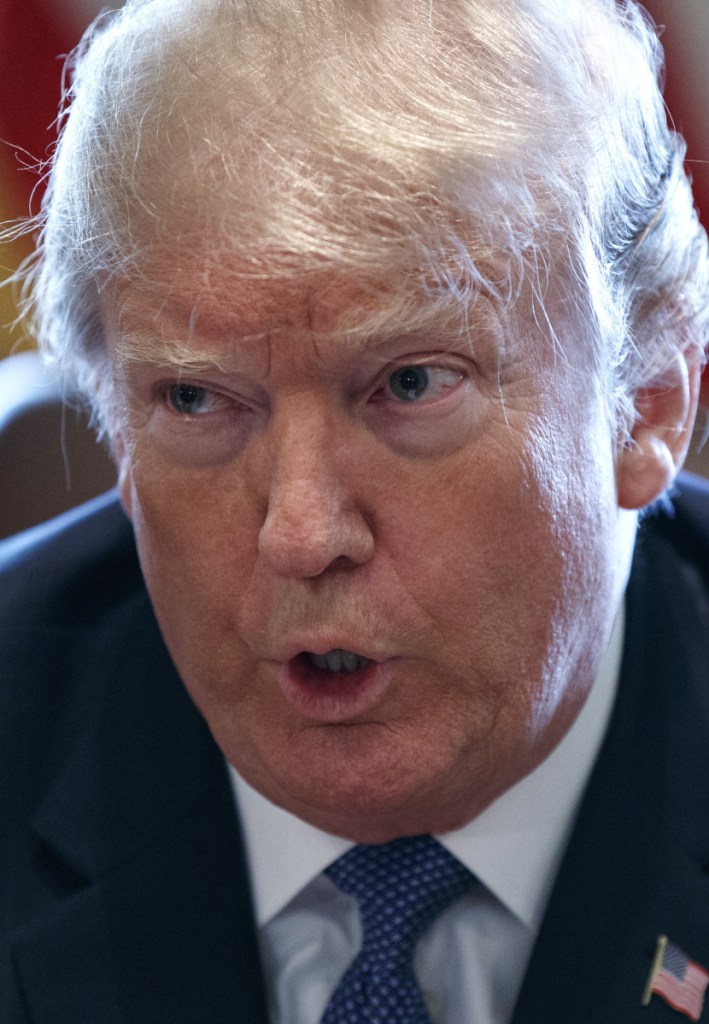WASHINGTON — President Trump acknowledged Monday that farmers could be adversely affected by the escalating tariff dispute with China, but promised to make it up to them, saying they “will be better off than they ever were.”
Speaking at a Cabinet meeting, Trump addressed the Chinese threat to slap tariffs on soybeans and other agriculture staples grown in rural America, a move that could hit Midwestern farmers, many of whom are strong supporters of the president.
“If during the course of the negotiation they want to hit the farmers because they think that hits me, I wouldn’t say that’s nice, but I tell you, our farmers are great patriots,” Trump said. “They understand that they’re doing this for the country. We’ll make it up to them. In the end they’re going to be much stronger than they are right now.”
China is threatening the tariffs in response to Trump moving to enact protectionist measures as punishment for Chinese theft of U.S. intellectual property. The U.S. bought more than $500 billion in goods from China last year and now is planning or considering penalties on about $150 billion of those imports.
As the economic saber-rattling shakes global markets, Trump said Monday he had a good relationship with China and with President Xi Jinping, but repeated his claim that China has been “taking advantage of the United States for many years.” He said he blames American leaders, not China, for creating a “lopsided” set of trade rules.
Earlier in the day, Trump tweeted about the “STUPID TRADE” with China, saying that when a Chinese-made vehicle is sent to the U.S., the tariff is only 2.5 percent, while American cars exported to China are slapped with a 25 percent tariff.
China charges total duties of 25 percent on most imported cars – a 10 percent customs tariff plus a 15 percent auto tax. Since December 2016, Beijing also has charged an additional 10 percent on “super-luxury” vehicles priced above 1.3 million yuan ($200,000).
The president made fixing the trade imbalance with China a centerpiece of his presidential campaign, where he frequently used incendiary language to describe how Beijing would “rape” the U.S. economically. But even as Trump cozied up to Xi and pressed China for help with derailing North Korea’s nuclear ambitions, he has ratcheted up the economic pressure and threatened tariffs, a move opposed by many fellow Republicans.
The U.S. sold about $130 billion in goods to China in 2017 and faces a potentially devastating hit to its market there if China responds in kind.
China has pledged to “counterattack with great strength” if Trump decides to follow through on the tariffs. Beijing also declared that the current rhetoric made negotiations impossible, even as the White House suggested that the tariff talk was a way to bring China to the bargaining table.
The new White House economic adviser, Larry Kudlow, said Sunday that a “coalition of the willing” – including Canada, much of Europe and Australia – was being formed to pressure China and that the U.S. would demand that the World Trade Organization, an arbiter of trade disputes, be stricter on Beijing. And he said that although the U.S. hoped to avoid taking action, Trump “was not bluffing.”
“This is a problem caused by China, not a problem caused by President Trump,” Kudlow said on “Fox News Sunday.”
But he also downplayed the tariff threat as “part of the process,” suggesting on CNN that the impact would be “benign” and saying he was hopeful that China would enter negotiations. Kudlow, who started his job a week ago after his predecessor, Gary Cohn, quit over the tariff plan, brushed aside the possibility of economic repercussions.
“I don’t think there’s any trade war in sight,” Kudlow told Fox.
Treasury Secretary Steve Mnuchin said on CBS’ “Face the Nation” that he didn’t expect the tariffs to have a “meaningful impact on the economy” even as he left the door open for disruption. He allowed that there “could be” a trade war but said he didn’t anticipate one.
Trump’s latest proposal intensified what was already shaping up to be the biggest trade battle in more than a half century.
Trump told advisers last week that he was unhappy with China’s decision to tax $50 billion in American products, including soybeans and small aircraft, in response to a U.S. move to impose tariffs on $50 billion in Chinese goods. Rather than waiting weeks for the U.S. tariffs to be implemented, Trump backed a plan by Robert Lighthizer, his trade representative, to seek the enhanced tariffs.
Further escalation could be in the offing. The U.S. Treasury Department is working on plans to restrict Chinese technology investments in the U.S. And there is talk that the U.S. could also put limits on visas for Chinese who want to visit or study in this country.
Send questions/comments to the editors.



Comments are no longer available on this story